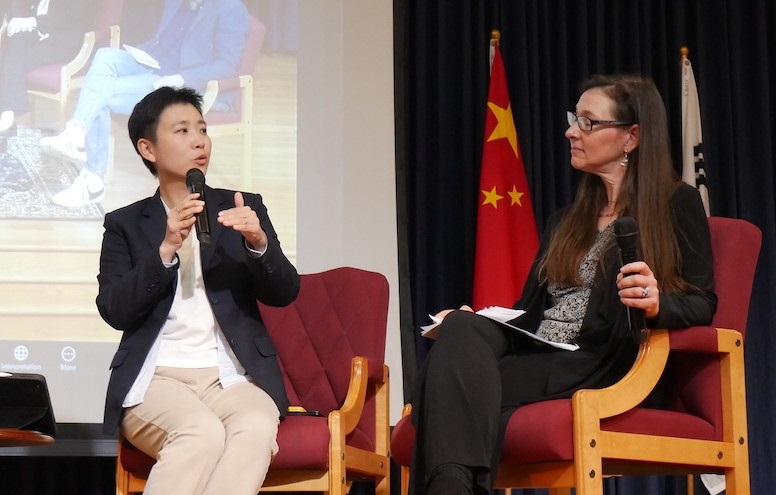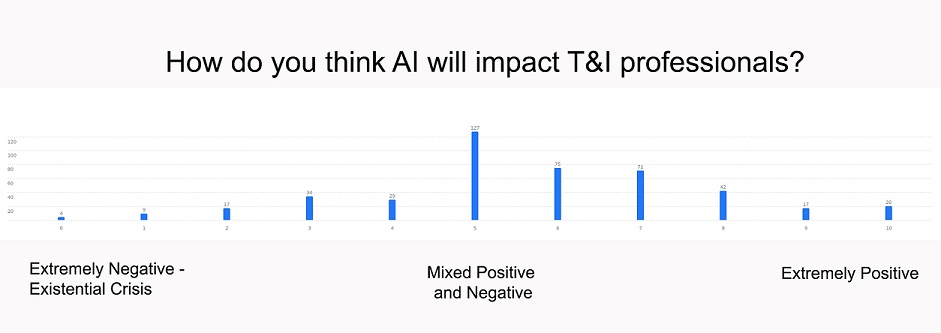New Short Course on Note-Taking for Consecutive Interpreting
| by Sierra Abukins
The self-paced online course is taught by Professor Laura Burian and helps you build the foundation to build a strong note-taking practice over time.

“Disruption.” “Astonishing.” “Opportunity.”
These are just a few of the words panelists at our recent event about the future of translation and interpretation said come to mind when they think about artificial intelligence (AI).
On May 2, 2024, Laura Burian, dean of teaching, learning, and faculty development at the Middlebury Institute, moderated two panel discussions with eight practitioners, educators, and industry leaders. See the panelists’ bios.
In the lead-up to the event, the Institute conducted a survey of 450 practitioners, educators, and students; it revealed a huge range of emotions and predictions on how AI will impact the $72.7 billion language services industry.
Embrace ambiguity.
Most respondents expect AI to have a mix of good and bad effects, with responses tipping ever so slightly toward the positive side. On a scale from 1 to 10, with 1 being an existential threat and 10 being entirely positive, the average was 5.69 out of 10 However, that average masks a much wider range of perspectives, as can be seen in this chart:

Respondents also shared the words that come to mind for them when they think of AI.

The first panel featured:
Natalia Bondonno, Chief of the Verbatim Reporting Service, United Nations
Winnie HEH, Founding member of the Interpreting SAFE-AI Task Force and Career Advisor, Middlebury Institute of International Studies
Yang YU, President, China Translation Corporation, Chairman, Global Tone Communication Technology Co., Ltd., Executive Director and Deputy Director, Conference Interpreting Committee, Translators Association of China(TAC)
See our second panel focused on education and research with:
Carles Andreu,
Associate Professor, Translation, Middlebury Institute of International Studies
Wallace CHEN,
Professor and Program Head of Chinese-English Translation and Interpretation, Middlebury Institute of International Studies
Chiaming (Damien) FAN, PhD,
Vice President, Executive Committee of the International Association of Conference Interpreters (AIIC), Associate Professor, Graduate Program in Translation and Interpretation, National Taiwan University
Weiwei WANG, PhD,
Vice Dean of the School of Interpreting and Translation Studies, Guangdong University of Foreign Studies and Visiting Scholar at Middlebury Institute
These are some of the key themes that emerged in the two-hour conversation. See the full bios of the panelists.
Wallace Chen detailed the wide range of ways he’s already using the tools, including for terminology research, generating text summaries, creating transcripts, keyword retrieval, text segmentation, chunking, and text comparison. He quoted futurist Graeme Codrington: “The real value and everyday use of AI is to be found in its potential to be not AI but IA—an Intelligent Assistant for us.”
“To say that technology is going to replace human is not a valid argument in its own right. We shouldn’t think of machines as our enemies, because machine translation is dealing with data that people couldn’t have previously. The amount of data has been exploding. In this era, we should learn to coexist with these machines and AI to treat them as partners and aides.” —Yang Yu
“The quality continues to be the responsibility of the language professional. Embrace the tools, use them, and build your judgment on how to use them. We hardly ever translate from scratch…I don’t think we need to worry about being replaced. We need to learn how to work with the tools.” —Natalia Bondonno
To say that technology is going to replace humans is not a valid argument in its own right…In this era, we should learn to coexist with these machines and AI to treat them as partners and aides.
The job market is being disrupted right now, with employers still figuring out how to restructure teams and roles for the new reality. Early-career professionals should focus more on the skills and responsibilities than the job title. Mid-career professionals might be surprised at how their skills can transfer to other roles in the language services industry. For example, a translator may want to transition into a localization project manager role or any of the other new roles emerging in the language industry.
“Don’t get too hung up on the job titles…be open-minded. Think about what you bring to the table and don’t let the job title limit your impact. This is part of the decades-long process of digital transformation globally. We are all somewhat shooting in the dark, and this in-the-dark period is uncomfortable. Employers expect hiring needs to change, but the job descriptions still look the same right now because the new needs haven’t yet been translated into concrete knowledge, skill, and abilities. The clarity will emerge.” —Winnie Heh
Damien Fan, Vice President of the Executive Committee of the International Association of Conference Interpreters (AIIC), admitted he initially held many prejudices against AI. He is not alone among interpreters. An in-depth survey conducted by SafeAI found that respondents had strong feelings about whether AI interpretation apps and tools were good, but only 11 percent had actually tried them. Panelists encouraged everyone to experiment with the tools to become truly informed evaluators.
“Being scared of technology is legitimate. Try to enjoy it.” —Carles Andreu
“Get comfortable with ambiguity. We’re all trying to figure it out, and no one has the key to the right answer. Work with the AI technology developers—be part of shaping the solution, don’t let it happen to you. Adopt some agency. Get yourself to the table.” —Winnie Heh
“Embrace AI. I hope we can all harness its power. We should lead on enhancing the AI algorithm. We should join in. The time to act is now. If not us, then who? If not now, then when? Stay curious—keep learning and adapting to blend the best of technology with the art of language.” —Weiwei Wang
We need to learn how to work with the tools.
Many panelists have observed that overall, the market is expanding and is still strong for the top translators and interpreters, but is getting harder for those with mediocre skills as clients look to AI to save money.
“There is a huge market—there has never been as much material translated as today. But you need a higher level than previous generations. If you can’t translate better than a machine, you’ll find it hard to get someone to pay you for your work. That’s a big change. It used to be that you could learn to translate while being paid and take a couple of years to learn. The bar for what ‘market-ready’ is has been raised dramatically. New translators need to hit the ground running.” —Carles Andreu
The bar for what ‘market-ready’ is has been raised dramatically. New translators need to hit the ground running.
Many panelists advised current students to focus on building fluency in their target language and their strength in the areas where humans outperform machines, like interpersonal communication and cultural nuance. The most important skills for translators and interpreters continue to be excellent bilingual language proficiency, analytical skills, critical thinking, broad knowledge on a range of subjects, and the ability to quickly go deep in new subject area. What is also important now is the ability to learn what new technology can do and determine how to appropriately incorporate that technology into your work.
“Don’t lose sight of the added value that you bring, because if you lose sight of that, you aren’t that different from the tool. Focus on building your target language skills—that is crucial. That’s the only way you’ll be able to lift up what the tool brings to provide value to your organization.” —Natalia Bondonno
“The skills that will make you valuable are the old-school skills: analytical skills, critical reading, cultural nuance, and sensitivity.” —Carles Andreu
“Interpersonal skills are critical. You must first know who you are. Learning such a difficult skill as interpretation forces us to reckon with ourselves and our identities. You are first a person—a living human being—before you are a translator or interpreter. Know thyself better.” —Damien Fan
“The T&I profession has been around for over 3,000 years. The keys to its longevity are things like ingenuity, critical thinking, adaptability, ethics, and curiosity.” —Wallace Chen
Know thyself better.
A very consistent theme was that translators and interpreters need to help clients better understand how they use technology tools in their work and the key quality and ethical considerations to navigate when making decisions about the mix of AI and human translation and interpretation sources.
“When neural machine translation came in, I think that was the big disruptive moment for us, and we learned how to incorporate it into our work, how to use it, and when not to use it. The challenge to us now is how we communicate this to clients.” —Natalia Bondonno
“[With AIIC], it’s not about teaching how to use a specific tool, but gaining a basic understanding of how these tools work and the related issues. What do we say when employers say they are going to try AI interpreting? How do we explain from a cost perspective? From a risk and communications perspective?” —Damien Fan
Yang Yu’s company handled 500 million pieces of translation last year, and he’s seen productivity rise with the daily output of translators going from 3,000 words per day in 2003 to 8,000 words per day today, thanks to machine translation.
“In 2023, we did 2,000 simultaneous interpreting events, 500 completely by machines with no human interventions. That’s a shocking number, isn’t it? In venues with 1,000 people, machine simultaneous interpreting can do a surprisingly good job, with 90 to 95 percent accuracy. Especially since the pandemic, people are used to remote meetings, and a lot of meetings have been using machine translation.” —Yang Yu
To what extent do people trust AI interpretation? When do they prefer it? These are just a few of the countless questions that can’t be answered right now—and haven’t even been researched.
“At Guangdong University of Foreign Studies, computer-assisted conference interpretation (CACI) is not only a subject we teach, but also a research area.” —Weiwei Wang
“In the short term, there’s still a preference for in-person interpretation, but in the long term, that could change. When we look at policies, we need to anticipate the improvement in the technology. The question is not whether AI interpretation tools should be used, it’s in what use cases it should be used. SafeAI Task Force is working on writing guiding principles.” —Winnie Heh
| by Sierra Abukins
The self-paced online course is taught by Professor Laura Burian and helps you build the foundation to build a strong note-taking practice over time.
| by Laura Burian, Charles Cai, and Xiaohui Hu
First-year translation and interpretation students from across multiple languages came together and broke down cultural barriers as they put their growing interpretation skills to test.
| by Sierra Abukins
Multilingual Magazine recently published a feature on how a friendship between Associate Professor Eva Klaudinoyva and two fellow localization professionals has grown into a volunteer-powered organization that now has a world-wide network of 9,000 members.